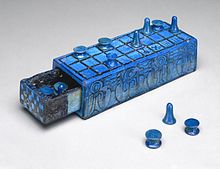The Games Portal

A game is a structured type of play, usually undertaken for entertainment or fun, and sometimes used as an educational tool. Many games are also considered to be work (such as professional players of spectator sports or games) or art (such as jigsaw puzzles or games involving an artistic layout such as Mahjong, solitaire, or some video games).
Games are sometimes played purely for enjoyment, sometimes for achievement or reward as well. They can be played alone, in teams, or online; by amateurs or by professionals. The players may have an audience of non-players, such as when people are entertained by watching a chess championship. On the other hand, players in a game may constitute their own audience as they take their turn to play. Often, part of the entertainment for children playing a game is deciding who is part of their audience and who is a player. A toy and a game are not the same. Toys generally allow for unrestricted play whereas games present rules for the player to follow.
Key components of games are goals, rules, challenge, and interaction. Games generally involve mental or physical stimulation, and often both. Many games help develop practical skills, serve as a form of exercise, or otherwise perform an educational, simulational, or psychological role. (Full article...)
Selected article -
The Royal Game of Ur is a two-player strategy race board game of the tables family that was first played in ancient Mesopotamia during the early third millennium BC. The game was popular across the Middle East among people of all social strata, and boards for playing it have been found at locations as far away from Mesopotamia as Crete and Sri Lanka. One board, held by the British Museum, is dated to c. 2600 – c. 2400 BC, making it one of the oldest game boards in the world.
The Royal Game of Ur is sometimes equated to another ancient game which it closely resembles, the Game of Twenty Squares. (Full article...)Did you know? -
- ...that in 1967, Mac Hack became the first computer chess program to defeat a person in tournament play?
- ...that a reviewer called the narrator in the game Defenders of Ardania (pictured) "booze-obsessed", with a voice that sounds like "a Dalek doing an impression of Sean Connery"?
- ...that snooker player Stephen Maguire won his first ranking tournament at the 2004 European Open in Malta?
- ...that the Crawford-Gilpin House is alleged to have once changed owners due to being lost as a wager in a poker game?
- ...that The Big Bang Theory episode "The Santa Simulation" features a Christmas-themed Dungeons & Dragons game?
General images
Subcategories
Related portals
WikiProjects
Things to do
Selected picture

A riffle shuffle being performed during a game of poker
Associated Wikimedia
The following Wikimedia Foundation sister projects provide more on this subject:
-
Commons
Free media repository -
Wikibooks
Free textbooks and manuals -
Wikidata
Free knowledge base -
Wikinews
Free-content news -
Wikiquote
Collection of quotations -
Wikisource
Free-content library -
Wikiversity
Free learning tools -
Wiktionary
Dictionary and thesaurus



















































